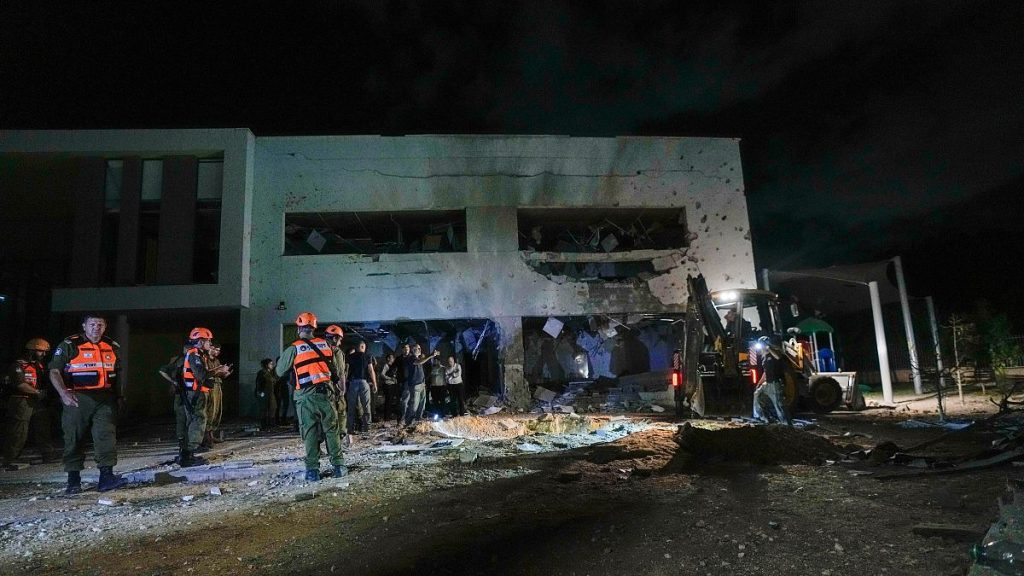Political leaders across Europe have strongly condemned Iran’s ballistic missile strikes on Israel, with European Commission President Ursula von der Leyen urging all parties to protect innocent civilians and calling for a ceasefire across the border with Lebanon and in Gaza. Israeli Prime Minister Benjamin Netanyahu has promised retaliation following the attack, which comes after the Israeli army’s bombardment of Lebanon, resulting in the deaths of senior members of the Iranian-backed militant group Hezbollah. The ongoing tit-for-tat attacks between various parties in the region have raised concerns of an uncontrollable regional escalation, prompting calls for maximum restraint and efforts to deescalate tensions from European leaders.
The European Union’s foreign policy chief Josep Borell and European Council President Charles Michel have both expressed readiness to support efforts to deescalate tensions in the region, emphasizing that a regional war is not in anyone’s interest. UK Prime Minister Keir Starmer and German Chancellor Olaf Scholz have also condemned Iran’s attack on Israel, with Starmer warning that the incident threatens to push the region closer to the brink of war and Scholz praising Israel’s Iron Dome defence system for preventing a worse outcome. Spain’s President Pedro Sánchez, who recently recognised Palestinian statehood, has called for an end to the spiral of violence and stressed the importance of eventual ceasefires between Israel and Hamas and Israel and Hezbollah in securing lasting peace in the region.
The missile strikes by Iran on Israel have intensified tensions in the already volatile Middle East, with fears of further escalation and a wider regional conflict looming large. The ongoing conflict between Hezbollah and Israel, as well as the Hamas-Israel war, has resulted in significant loss of life, with thousands of Palestinians killed in the Gaza Strip due to Israeli airstrikes and ground incursions. The situation has drawn strong condemnation from political leaders both within Europe and globally, with calls for all parties involved to exercise restraint and work towards peaceful resolutions to avoid further bloodshed and instability in the region.
The threat of retaliation from Israel in response to the missile strikes by Iran has raised concerns about a potential spiral of violence and a deepening of the conflict. The EU has reiterated its support for efforts to deescalate tensions and emphasized the need for all parties to prioritize the protection of innocent civilians and work towards peaceful resolutions to the ongoing conflicts in the region. The condemnation of Iran’s actions by European leaders reflects a unified stance against aggressive military actions and a commitment to promoting peace and stability in the volatile Middle East.
The European leaders’ call for a ceasefire and an end to hostilities in the region highlights the importance of diplomatic efforts to prevent further bloodshed and avert a wider regional conflict. The recognition of the devastating impact of the ongoing violence on innocent civilians, including women and children, underscores the urgency of finding peaceful resolutions to the conflicts in the Middle East. The condemnation of Iran’s missile strikes by political leaders across Europe reflects a shared commitment to upholding international norms and preventing further destabilization in a region already beset by violence and turmoil.
As tensions continue to simmer in the Middle East following Iran’s missile strikes on Israel, the international community, including European leaders, faces the challenge of preventing a further escalation of hostilities and working towards lasting peace in the region. The calls for restraint, deescalation, and ceasefire from European political leaders signal a commitment to promoting dialogue and diplomacy as the primary means to resolve conflicts and avoid the devastating consequences of war. The strong condemnation of Iran’s actions and the continued support for peaceful resolutions demonstrate a unified stance in favor of stability and security in the region, while underscoring the importance of multilateral cooperation in addressing complex geopolitical challenges.


